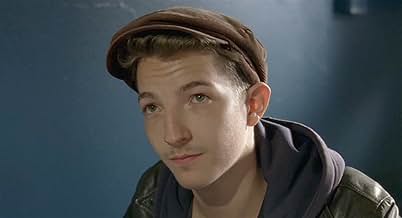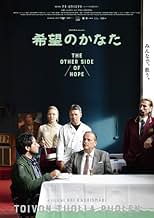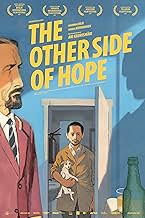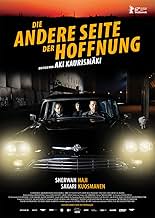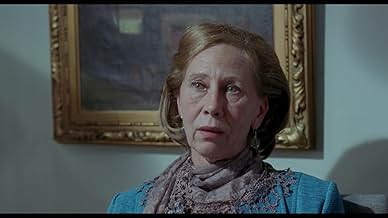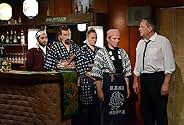CALIFICACIÓN DE IMDb
7.2/10
14 k
TU CALIFICACIÓN
El propietario de un restaurante, jugador de póquer y antiguo agente comercial, hace amistad con un grupo de refugiados recién llegados a Finlandia.El propietario de un restaurante, jugador de póquer y antiguo agente comercial, hace amistad con un grupo de refugiados recién llegados a Finlandia.El propietario de un restaurante, jugador de póquer y antiguo agente comercial, hace amistad con un grupo de refugiados recién llegados a Finlandia.
- Premios
- 8 premios ganados y 24 nominaciones en total
Abdi Jama
- Aseman kassa
- (as Abdi alias 'Lii' Jama)
Simon Al-Bazoon
- Mazdak
- (as Simon Hussein Al-Bazoon)
- Dirección
- Guionista
- Todo el elenco y el equipo
- Producción, taquilla y más en IMDbPro
Opiniones destacadas
Remember the pretty boy Ronan Keating singing that you say it best when you say nothing at all? Of course you don't, you only listen to good music. But this could be the very motto of Finnish legendary moviemaker Aki Kaurismäki's latest. This minimalist masterpiece is so achingly simple and elegant and yet so complex in a good way, that there's no really good way to describe it, if you don't understand Kaurismäki's style already. Toivon tuolla puolen" (The Other Side of Hope" in English, Teispool lootust" in Estonian") is like a haiku: it can convey so much with so little words and even so little action. I can't find fitting comparisions here, but Kaurismäki comes across like Jim Jarmusch's less snobish cousin: even more concentrated on what it's like to be human and small things that life is actually made of. They both value storytelling through details but Kaurismäki's approach is more mainstreamfriendly: you don't have to invest yourself fully all the time to make sense of what's going on exactly. Toivon tuolla puolen" offers two bittersweet stories interwining, about refugee in strange and hostile land and old entrepreneur who leaves his wife and finds fresh start in running a diner. It often feels like comedy – Kaurismäki's approach could be called Finnish version of Soviet nostalgia that many 30-year or older viewers will respond to and enjoy. Judging by Estonian premiere, it's a real crowdpleaser. But deeper down it's more about bleak and sad side of human existence: loneliness, being unwanted, trying to find purpose when everything has fallen down. And, of course, about how there's no winning with nowadays' refugee crisis – it brings suffering for everyone involved, except for maybe those who like to attack people who shouldn't be here". I give this quietly hilarious and heartbreaking masterpiece a near- perfect score. Although it doesn't break new grounds for Kaurismäki, I can't think of a way how it could be improved in any meaningful way. The movie's not gonna satisfy everybody, nothing will, but it's almost perfect the way it is. Deceptively simple but powerful experience that you can't imagine getting from anybody else than Kaurismäki.
Aki Kaurismäki's film 'The Other Side of Hope' is really two films in one: the first, a deadly serious look at the life of a Syrain refugee in Finland, and the other, a deadpan comic look at the escapades of an unlikely restauranteur. Oddly, it works, with its direct abutment of light and shade, and its playful treatment of the legendary Finish characteristic of taciturnity. A nice element of the movie is it's use of music as a symbol of our common humanity. It's a simple film, but I liked it.
In Aki Kaurismäki's 2016 film TOIVON TUOLLA PUOLEN ("The Other Side of Hope"), the Finnish auteur continues a theme he explored in LE HAVRE from five years earlier: refugees fleeing to Europe and forced to survive when heartless officials and some locals are against them. While that earlier film was shot in the comparatively exotic setting of the eponymous French port, TOIVON TUOLLA PUOLEN returns to Kaurismäki's familiar stomping grounds of downtown Helsinki.
The film consists of two converging plot lines. In one, the aging salesman Wikström (Sakari Kuosmanen, a longtime member of Kaurismäki's acting stable) leaves his wife, wins a lot of money in a poker game, and decides to open a restaurant. In the other, the Syrian refugee Khaled (Sherwan Haji) arrives in Helsinki after fleeing war-torn Aleppo and wandering across half of Europe, but he is worried about his sister that he got separated with along the way. Wikström and Khaled eventually meet and become friends -- or the closest thing to friends that Kaurismäki's exaggeratedly cold and morose Finns can get to each other. Before that, however, the Wikström plot line serves to inject some humour, albeit of an extremely deadpan sort, into a film that, though Khaled, explores the depressing lives of refugees who are shuffled from one center to another and forced to wait for their cases to be processed.
For three decades now, Kaurismäki has made all his films to a very distinctive template that virtually never varies. Its characters speak a minimum of dialogue to each other and show little expression on their faces. The sets are drab in colour and deliberately anachronistic, with gadgets, vehicles or clothes from the 1950s alongside computers and mobile phones from our time. At some point, a band will appear on stage playing oldies rock, blues, or Finnish tangos as the characters look on.
TOIVON TUOLLA PUOLEN doesn't stray from that template either. Still, the script has enough fresh moments to it that it will feel worthwhile even to longtime Kaurismäki films who have sat through this template many times before. Some of the humorous bits are laugh-out-loud funny, but overall this does feel like a darker film than most of the director's work. It is ultimately a choked, restrained cry of rage at the way that refugees are treated, by a Nordic society that prides itself on fairness, equality and charity. While Kaurismäki is roughly on the left politically, several of his films have attacked the Finnish welfare state for its opaque bureaucracy and its reduction of human beings to mere papers in a government file. This film continues that critique by depicting the refugees, who come from many countries but manage to band together to lend each other help, as the sort of neighborly solidarity that Kaurismäki prefers to faceless bureaucracy.
I personally wouldn't find this the best introduction to Kaurismäki. His earlier film MIES VAILLA MENNEISYYTTÄ ("The Man Without a Past") depicted with more meat on its bone a down-on-his-luck man lost among bureaucracy, while the über-idiosyncratic romantic comedy VAROJA PARATIISISSA ("Shadows in Paradise") is one of Kaurismäki's best achievements in deadpan humour. Still, TOIVON TUOLLA PUOLEN seems to tell a story universal enough to pull on everyone's heartstrings and is worth seeing.
The film consists of two converging plot lines. In one, the aging salesman Wikström (Sakari Kuosmanen, a longtime member of Kaurismäki's acting stable) leaves his wife, wins a lot of money in a poker game, and decides to open a restaurant. In the other, the Syrian refugee Khaled (Sherwan Haji) arrives in Helsinki after fleeing war-torn Aleppo and wandering across half of Europe, but he is worried about his sister that he got separated with along the way. Wikström and Khaled eventually meet and become friends -- or the closest thing to friends that Kaurismäki's exaggeratedly cold and morose Finns can get to each other. Before that, however, the Wikström plot line serves to inject some humour, albeit of an extremely deadpan sort, into a film that, though Khaled, explores the depressing lives of refugees who are shuffled from one center to another and forced to wait for their cases to be processed.
For three decades now, Kaurismäki has made all his films to a very distinctive template that virtually never varies. Its characters speak a minimum of dialogue to each other and show little expression on their faces. The sets are drab in colour and deliberately anachronistic, with gadgets, vehicles or clothes from the 1950s alongside computers and mobile phones from our time. At some point, a band will appear on stage playing oldies rock, blues, or Finnish tangos as the characters look on.
TOIVON TUOLLA PUOLEN doesn't stray from that template either. Still, the script has enough fresh moments to it that it will feel worthwhile even to longtime Kaurismäki films who have sat through this template many times before. Some of the humorous bits are laugh-out-loud funny, but overall this does feel like a darker film than most of the director's work. It is ultimately a choked, restrained cry of rage at the way that refugees are treated, by a Nordic society that prides itself on fairness, equality and charity. While Kaurismäki is roughly on the left politically, several of his films have attacked the Finnish welfare state for its opaque bureaucracy and its reduction of human beings to mere papers in a government file. This film continues that critique by depicting the refugees, who come from many countries but manage to band together to lend each other help, as the sort of neighborly solidarity that Kaurismäki prefers to faceless bureaucracy.
I personally wouldn't find this the best introduction to Kaurismäki. His earlier film MIES VAILLA MENNEISYYTTÄ ("The Man Without a Past") depicted with more meat on its bone a down-on-his-luck man lost among bureaucracy, while the über-idiosyncratic romantic comedy VAROJA PARATIISISSA ("Shadows in Paradise") is one of Kaurismäki's best achievements in deadpan humour. Still, TOIVON TUOLLA PUOLEN seems to tell a story universal enough to pull on everyone's heartstrings and is worth seeing.
There's no doubt about it, Aki is back once again with a wonderful film. "The Other Side of Hope" basically tells two stories. First there's an older Finnish man who opens a small restaurant. And then there's a Syrian man who finds his way to Finland in order to start a new life. As you can probably guess, these two stories find a way to connect. And in a surprisingly good and heartwarming way.
It was interesting to see the two cultures interact with each other. I love the kindness that so many characters bring with them. The film finds an excellent way to mix humour with drama while also bringing up some relevant issues. Many of the restaurant scenes are very funny and they made me laugh. While other scenes like when a character plays music from his homeland one final time before being deported almost brought a little tear to my eye. The entire thing is still packed with all the classic Kaurismäki elements. You can almost do a drinking game; "Point out all of Aki's personal tropes". I have to say that some of my favorite parts were whenever they were trying to change the restaurant in order to fit in with the modern times. It was almost metaphorical. It's like the filmmakers themselves had never changed, but the world around them did.
Timo Salminen's cinematography is on point with excellent use of framing and colors. I admire that they still use film instead of digital. Aki is very similar to Tarantino in that subject. He has said that if they weren't able to use film he would stop making movies all together. I hope this is not his final movie. I feel like he has many stories left to tell. I'll be here waiting for whenever a new one comes out, because I never get tired of the personality that comes with his work.
It was interesting to see the two cultures interact with each other. I love the kindness that so many characters bring with them. The film finds an excellent way to mix humour with drama while also bringing up some relevant issues. Many of the restaurant scenes are very funny and they made me laugh. While other scenes like when a character plays music from his homeland one final time before being deported almost brought a little tear to my eye. The entire thing is still packed with all the classic Kaurismäki elements. You can almost do a drinking game; "Point out all of Aki's personal tropes". I have to say that some of my favorite parts were whenever they were trying to change the restaurant in order to fit in with the modern times. It was almost metaphorical. It's like the filmmakers themselves had never changed, but the world around them did.
Timo Salminen's cinematography is on point with excellent use of framing and colors. I admire that they still use film instead of digital. Aki is very similar to Tarantino in that subject. He has said that if they weren't able to use film he would stop making movies all together. I hope this is not his final movie. I feel like he has many stories left to tell. I'll be here waiting for whenever a new one comes out, because I never get tired of the personality that comes with his work.
Saw this at the Berlinale 2017, where it was part of the official competition for the Golden Bear. The synopsis on the festival website was not really promising, but my prejudice disappeared gradually during the screening. Although the movie has a certain inclination to become a fairy tale where everyone will live happily ever after, the ending has some darker sides to downplay the assumed optimistic story. One of these darker sides lies in the several times appearing "Finland security" men, who are up to no good.
Our first main protagonist Khaled is seeking asylum in Finland. From the outside, it looks like a very clean process as far as shown to us. The idle waiting time related to the asylum application procedure does hide the rough edges we often read about, namely that asylum seekers among themselves are making trouble when seeing others with a different religion or other political position, or even worse when seeing GLBT behavior that they are not prepared to allow. Intolerance can be very problematic here, given that the people are packed together, while at the same time being bored to death, doomed to wait, unable to do anything useful. Due to their numbers and possible variations in asylum seekers, it is a sheer impossible task to sort and separate them in such a way that such troubles are prevented. In this movie, however, the asylum seekers are living harmoniously together, and help each other where they can without seeking favors in return. What does Finland do what we apparently are doing wrong in The Netherlands??
Our second main protagonist Wikström follows a completely different path. On a random morning, he leaves his wedding ring and house keys with his wife, who is clearly alcohol addicted. He sells his stock but keeps the storage space (will become unexpectedly useful later). What also proves useful is his poker face, and he succeeds in multiplying his amount of cash considerably, to the extent that he can buy a restaurant including staff. The capabilities of the restaurant staff that he takes over with the rest of the inventory and furniture, do not look very promising from the outset, but he keeps them nevertheless.
For the first 30 minutes or so, the stories of above two main protagonists run their completely separate course. We see them in turns, both paths clearly delineated, simply by having other people and another decor visible. After his asylum request being denied, and just before being transported to a plane to be sent back, Khaled escapes and starts an uncertain life on the street. He is found sleeping between the trashcans by fresh restaurateur Wikström, from which moment on their lives become mingled.
The restaurant business does not go as well as may be hoped. Given the quality of the staff that he inherited when buying the restaurant, it can be no surprise from the first day on. For example, when someone orders sardines from the menu, that seems to mean that he receives a half opened can. More humor follows later on when they try out different restaurant types, e.g. sushi being prepared out of a cooking book. Other experiments also hardly succeed. A surprise inspection is handled in a way not exactly by-the-book but they pass. These humoristic scenes are intermixed with the more serious main line of the story.
The story includes a series of lucky strikes and happy coincidences that is overwhelming, bordering on statistically impossible. But otherwise there would have been no story to tell, so who am I to complain. The musical fragments we witnessed, most in cafés or restaurants, even one where Khaled plays the sitar (is that the proper name?), albeit not relevant to the story itself, are included (I think) as ornamentation or as local folklore, or simply happened to be available and deemed a waste when left out.
All in all, this movie is much better than what the average synopsis promises. On the other hand, it is not easy to describe what it is exactly that makes the movie attractive. The serious undertone cannot be overlooked, given the hostilities encountered by Khaled, and the motivation for the denial of his asylum request is also a farce, based on wrong facts that we see refuted on TV, and gives Finland a bad name. However, the parallel story with Wikström and his restaurant takes good care of ample relief from the heavy material. I usually lower my expectations when a book or movie builds on two or more parallel story lines, by assuming that none of the stories could offer sufficient material to stand on its own feet, but this time my prejudice proved unjustified. The way both stories were mixed without disturbing the logical flow of events, may be one of the reasons this movie was awarded by the International Jury of the Berlinale 2017.
Our first main protagonist Khaled is seeking asylum in Finland. From the outside, it looks like a very clean process as far as shown to us. The idle waiting time related to the asylum application procedure does hide the rough edges we often read about, namely that asylum seekers among themselves are making trouble when seeing others with a different religion or other political position, or even worse when seeing GLBT behavior that they are not prepared to allow. Intolerance can be very problematic here, given that the people are packed together, while at the same time being bored to death, doomed to wait, unable to do anything useful. Due to their numbers and possible variations in asylum seekers, it is a sheer impossible task to sort and separate them in such a way that such troubles are prevented. In this movie, however, the asylum seekers are living harmoniously together, and help each other where they can without seeking favors in return. What does Finland do what we apparently are doing wrong in The Netherlands??
Our second main protagonist Wikström follows a completely different path. On a random morning, he leaves his wedding ring and house keys with his wife, who is clearly alcohol addicted. He sells his stock but keeps the storage space (will become unexpectedly useful later). What also proves useful is his poker face, and he succeeds in multiplying his amount of cash considerably, to the extent that he can buy a restaurant including staff. The capabilities of the restaurant staff that he takes over with the rest of the inventory and furniture, do not look very promising from the outset, but he keeps them nevertheless.
For the first 30 minutes or so, the stories of above two main protagonists run their completely separate course. We see them in turns, both paths clearly delineated, simply by having other people and another decor visible. After his asylum request being denied, and just before being transported to a plane to be sent back, Khaled escapes and starts an uncertain life on the street. He is found sleeping between the trashcans by fresh restaurateur Wikström, from which moment on their lives become mingled.
The restaurant business does not go as well as may be hoped. Given the quality of the staff that he inherited when buying the restaurant, it can be no surprise from the first day on. For example, when someone orders sardines from the menu, that seems to mean that he receives a half opened can. More humor follows later on when they try out different restaurant types, e.g. sushi being prepared out of a cooking book. Other experiments also hardly succeed. A surprise inspection is handled in a way not exactly by-the-book but they pass. These humoristic scenes are intermixed with the more serious main line of the story.
The story includes a series of lucky strikes and happy coincidences that is overwhelming, bordering on statistically impossible. But otherwise there would have been no story to tell, so who am I to complain. The musical fragments we witnessed, most in cafés or restaurants, even one where Khaled plays the sitar (is that the proper name?), albeit not relevant to the story itself, are included (I think) as ornamentation or as local folklore, or simply happened to be available and deemed a waste when left out.
All in all, this movie is much better than what the average synopsis promises. On the other hand, it is not easy to describe what it is exactly that makes the movie attractive. The serious undertone cannot be overlooked, given the hostilities encountered by Khaled, and the motivation for the denial of his asylum request is also a farce, based on wrong facts that we see refuted on TV, and gives Finland a bad name. However, the parallel story with Wikström and his restaurant takes good care of ample relief from the heavy material. I usually lower my expectations when a book or movie builds on two or more parallel story lines, by assuming that none of the stories could offer sufficient material to stand on its own feet, but this time my prejudice proved unjustified. The way both stories were mixed without disturbing the logical flow of events, may be one of the reasons this movie was awarded by the International Jury of the Berlinale 2017.
¿Sabías que…?
- TriviaThe actors playing siblings Khaled and Miriam are real-life siblings.
- ConexionesFeatured in Ismo Haavisto One Man Band: Midnight Man (2017)
- Bandas sonorasOi mutsi, mutsi
Written and performed by Tuomari Nurmio
Selecciones populares
Inicia sesión para calificar y agrega a la lista de videos para obtener recomendaciones personalizadas
- How long is The Other Side of Hope?Con tecnología de Alexa
Detalles
- Fecha de lanzamiento
- Países de origen
- Sitios oficiales
- Idiomas
- También se conoce como
- The Other Side of Hope
- Locaciones de filmación
- Helsinki, Finlandia(The city)
- Productoras
- Ver más créditos de la compañía en IMDbPro
Taquilla
- Presupuesto
- EUR 1,600,000 (estimado)
- Total en EE. UU. y Canadá
- USD 183,943
- Fin de semana de estreno en EE. UU. y Canadá
- USD 15,495
- 3 dic 2017
- Total a nivel mundial
- USD 4,282,973
- Tiempo de ejecución1 hora 40 minutos
- Color
- Mezcla de sonido
- Relación de aspecto
- 1.85 : 1
Contribuir a esta página
Sugiere una edición o agrega el contenido que falta

Principales brechas de datos
By what name was El otro lado de la esperanza (2017) officially released in India in English?
Responda

